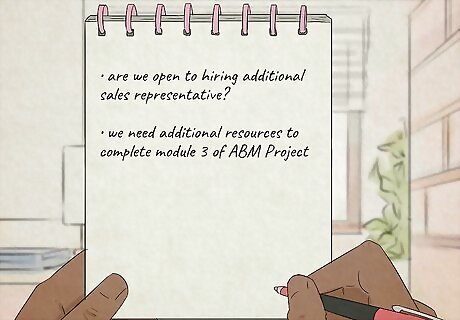
views
Greet your coworkers every day.

A quick hello shows your coworkers that you’re friendly. You see your coworkers every day, so be sure to acknowledge them when you see them. Just say something like “Hello” or “Good morning” in a warm and cheery tone the first time you see them during the day. Not only does this help you speak up more, but it invites the other person into a conversation.
Look approachable while you’re working.

Poor body language may make you seem closed off to conversations. Anytime you’re working, straighten your posture, keep your head up, and relax your shoulders. Keep your arms and legs uncrossed so you look open and receptive. Flash a smile at your coworkers so you look friendlier and eager to chat with them. Even when you’re deep in focus at work, take a second to think about your posture and how you appear to other people.
Make eye contact with your coworkers.

This helps you feel comfortable and connected when you talk to people. Whenever you’re speaking to someone or listening to them speak, try to match their gaze to show you’re focused on them. Since making eye contact makes you feel more involved in the conversation, it’s a lot easier to speak up and break out of your shell. Try to hold eye contact for about 60–70% of your interaction so you form a better bond. Be careful not to stare for too long since it could come across as too intense.
Find common ground to bond over.

You’re more likely to open up when you have the same interests. When you’re with your coworkers, pay attention to the things that they talk about or have in their work area. Try asking them questions about their hobbies, interests, or the things they like the most. You’re bound to have something in common that you’re able to talk about when you’re working together. For example, if your coworker brings up soccer, you can ask them what their favorite team is or if they watched the most recent game.
Write down your thoughts before meetings.

Get your ideas on paper so you know what to say. If you have a meeting coming up, look through the agenda to see what topics you’re discussing. Come up with a few questions or ideas and jot them down so you don’t forget them. When you have a chance to speak, try to bring up at least 1 of the points you listed. Even if you don’t say something out loud, you can always pass the ideas you wrote down to your supervisor to see if they want to incorporate them.
Aim to say 1 thing during meetings.

Try to hit this goal so you can actively participate. Even though it may seem tough to speak out, start with a small goal so it’s easy to track how you’re doing. Whenever you’re called into a meeting, look for something that adds value to the conversation and speak up. Even just a few quick statements show that you want to stay involved. Try speaking slightly louder than the other people without shouting so they can hear your voice. Jump on someone else’s idea if you don’t have your own. Chime in with something like, “That’s a good idea,” or “I was thinking of something similar.” Say something when it comes to your head so someone else doesn’t get it out before you can. If you’re not fully confident in your ideas, think about how you can ask it as a question instead. For example, instead of saying, “We should market to younger customers,” you could ask, “What do you think would happen if we started marketing towards our younger customers?”
Rehearse presentations beforehand.

Practice saying it out loud so it’s less scary doing it for real. It’s okay to feel a little nervous when you’re presenting in front of your coworkers, but practice makes perfect. Go over the points you want to make out loud and run through them a couple of times so you get used to presenting. If you have time, ask a friend or coworker you feel comfortable around to listen to you so you get experience talking in front of someone else. Try recording yourself and listen to see if there are still places you need to work on more.
Socialize at company events and happy hours.

Give yourself a chance to relax and bond more with your coworkers. A lot of companies plan events like parties, luncheons, picnics, or even getting drinks at the end of a shift. If you’re invited out to an event, make it a point to go even if it’s out of your comfort zone. Spend some time with the coworkers that you want to know the most so you can chat with them and unwind. See if anyone plays intramural sports or hosts a weekly game night with coworkers that you can attend as well.
Boost confidence with positive self-talk.

Feeling good about yourself makes it easier to speak up. Give yourself a few minutes every day to talk yourself up and feel more comfortable. Repeat a few affirmations, say things you like about yourself, and focus on having a positive mindset. While it may feel a little awkward at first, you’ll feel a lot more confident when you actually need to speak up For example, you could say something like, “I have good ideas,” or, “My coworkers want to hear what I have to bring to the table.”
Build off of your other strengths.

You’ll realize how much you have to offer even if you’re shy. Write down all of the other work duties that you excel at and show off your skills. List what you value about your job and your work ethic as well so you see all the positive things you bring to the table. When you need to speak up, shift the conversation so it relates to what you’re good at. For example, if you have strong communication with clients, you might spend your time during meetings focusing on customer relationships rather than budgets. If you have strengths around building relationships, you may want to connect with people, maybe it is through a one-on-one setting with someone rather than in a group setting.
Look for a mentor.

A mentor can teach and encourage you to break out of your shell. If there’s someone at work you admire for their outspokenness and drive, reach out to them and ask them for help. Your mentor can give you some tips that have worked for them so you have an easier time speaking up. Follow your mentor’s advice and actively work with them until you feel like more confident. For example, a mentor could be a senior employee or your supervisor.

















Comments
0 comment